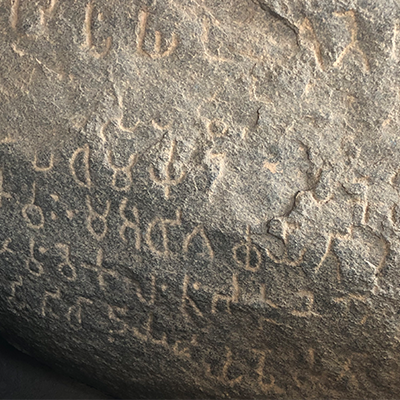dTT

Exploring the Rock Edicts of Ashoka
Emperor Ashoka’s pillar edicts have the quintessence of environmental preachings at various places across India.
The author embarked on a journey through Karnataka to explore Emperor Ashoka’s rock edicts and pillars, which reflect his love for nature and environmental protection. Ashoka, after witnessing the devastation of the Kalinga war, became a proponent of Buddhism and left behind these edicts as part of his commitment to peace and environmental stewardship.


BOOK EXCERPT
The Camping Diaries: Emperor Ashoka’s rock edicts
Catch a glimpse of the mesmerizing trip highlights!




Rock Support: King Ashoka’s Rock Edicts
Excerpt from the book:
Ashoka, the greatest king of all time, occupied the length and breadth of India and elsewhere during his reign, and was a lover of nature. To unearth the extent of his reign in Karnataka, Bali and I undertook a journey to look at the Ashokan rock edicts and pillars spread throughout the state. This time my ride as a pillion was to be a co-passenger in a four-wheeler. I had the liberty to observe everything from an altered perspective in much more depth and detail. Travelling on a bike or a jeep as a pillion has its similarities and differences. Unlike pillion on the bike, the co-traveller in a four-wheeler could write relaxedly, helping in navigation and other logistics while on the ride.
Ashoka: The First Environmentalist
Excerpt from the book:
Emperor Ashoka can be said to have been the first-ever environmentalist of his time—he implemented various measures to safeguard the environment. His rock and pillar inscriptions stand at eight places in Karnataka. These are protected monuments under the ambit of the Archeological Survey of India (ASI). The major towns and cities where these are located include Gulbarga or Kalaburagi, Raichur, Gangavathi, Koppal and Bellary. It is interesting to read his life story.
A Glimpse into History
Excerpt from the book:
Chandragupta Maurya, contemporary of Alexander the Great, was the founder of the Mauryan dynasty; Ashoka was his grandson. Ashoka ruled India from 274 to 232 BC. He repented after seeing the violence and cruelty that ensued during the Kalinga war. Though he won the war but was devastated at the bloodshed on the battlefield. He adopted Buddhism as atonement for his sins. He left behind many edicts at different places in his kingdom. These came to light in 1837 when James Prinsep was successful in decoding one found in Delhi. Only when they discovered the name ‘Ashoka’ inscribed on one rock in 1915 did scholars relate it to the earlier edicts that had ‘Beloved-of-the-Gods, King Piyadasi’, inscribed by the emperor.………..
Explore the untold stories of Rock Edict in book format or relive the journey with our expedition videos and stories!